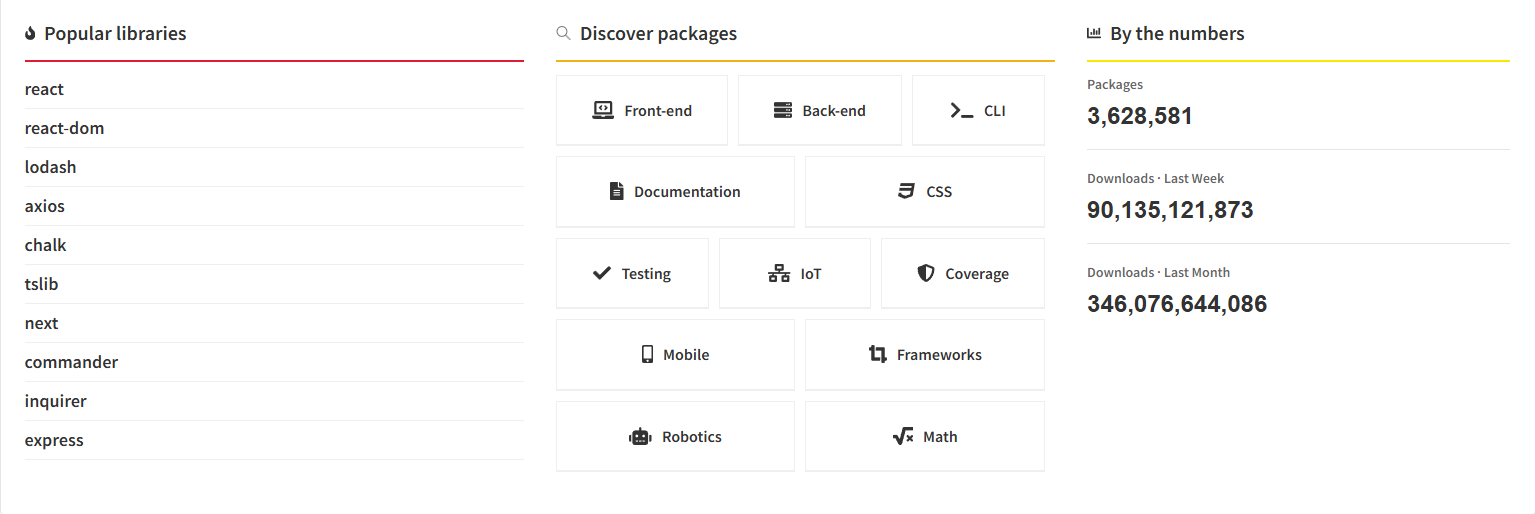Join JS Mastery Pro to apply what you learned today through real-world builds, weekly challenges, and a community of developers working toward the same goal.
Let me share a story. It’s a real story, an incident that happened in 2016. One of the most infamous npm stories ever.
A developer unpublished (removed) several of his packages from npm, including a tiny one called left-pad (just 11 lines of code that padded strings with spaces). Sounds trivial, right? But thousands of other packages (including big ones like Babel) depended on it. Suddenly, builds all over the world broke, including at major companies like Facebook, PayPal, Netflix, and Spotify.
The chaos was so widespread that npm had to take the unusual step of restoring the deleted package to stabilize the ecosystem. This incident perfectly illustrates how a single, seemingly insignificant package can create massive ripple effects because of npm’s deep dependency chains.
But here’s the thing, you’re not here just to hear a tech drama story. You’re here to answer bigger questions:
Let’s dig in and figure out whether learning programming is still a smart move in today’s AI-driven world
Imagine if Ryan Dahl, the creator of Node.js and co-creator of Deno, stopped developing these platforms because AI is “taking over” programming. After all, AI is smarter than ever, generating programs and even complete applications. What would happen then?
As of today, there are more than 3.6 million packages available on the Node Package Manager (npm).

All these packages were created by programmers, developers, and engineers worldwide.
What if all of them suddenly stopped programming and shifted to careers that AI cannot dominate? Could people still create applications just by giving a single AI prompt? Not entirely.
Here’s the point: AI tools make developers’ lives easier, but developers are the ones creating the software that powers AI. The code AI generates is based on human-written open-source packages. AI doesn’t invent entirely new programming languages or solve unseen industry problems on its own; it works with what already exists. For example:
When you prompt AI:
Create a backend project starter in Express”
or
“Create a Next.js application”
AI can generate code because the underlying tools and frameworks already exist. These languages, libraries, and frameworks solve real-world problems that AI alone cannot comprehend or innovate for. Humans understand context, observe situations, and respond to needs, things AI cannot do independently.
Yes, it’s true: work that once took several developers months to complete can now sometimes be done by one developer in a fraction of the time with AI assistance. But that doesn’t mean developers are losing jobs.

Image Source: 9gag
Think of it like this: did drones eliminate pilots, or did they create entirely new opportunities, not just a few drone pilots, but a whole new industry? Similarly, AI doesn’t replace developers; it opens up space for them to innovate, learn faster, and deliver more efficiently.
So, will AI take your job? No. It will make your work different, possibly more challenging, but also more impactful. The real question is: how can you thrive as a developer in the era of AI? Let’s find out.
The job market today is tough. Interviewers aren’t impressed if you can just build a simple TODO app or know the basics of frontend or backend. Companies aren’t hiring for basic work or just to assist senior developers, especially since senior developers are already leveraging Agentic AI and other AI tools.
To survive in this era, your foundational knowledge must be sharp and deep. You need to understand concepts thoroughly and pay attention to details from the start. AI can help you build complete applications quickly, but the code it generates often contains bugs, security vulnerabilities, performance issues, and structural problems. Relying solely on AI can easily result in messy, buggy projects.
If, however, you truly know your programming language, framework, or tools, you can identify and fix those issues quickly. You’ll be able to refine code, improve structure, optimize performance, and deliver high-quality projects efficiently.
In short, to survive, you need the knowledge to solve real problems, not just produce code.
So whatever you choose to learn, dive deep. Understand the mechanisms and concepts behind what you’re working on. That’s how you’ll excel in technical interviews when HR or senior engineers throw tough questions at you.
The takeaway: you must strive to be a good programmer, not just a typical one. But the next question is, how do you become a truly good programmer?
Einstein once said:
If I had an hour to solve a problem, I'd spend 55 minutes thinking about the problem and 5 minutes thinking about solutions.
You don’t need to be Einstein to become a good programmer. What you do need is a mind trained to think critically. Programming today isn’t just about writing lines of code; it’s about thinking and solving problems for others.
Remember the story about the npm package left-pad? Just 11 lines of code caused major projects at big tech companies to break. Those 11 lines existed for a purpose; they solved a specific problem. That’s why engineers and developers relied on them.
No matter the programming job you have, you’ll always face problems, some tiny, some huge. Developing a problem-solving mindset is what separates a good programmer from an average one.
And here’s the funny part: you don’t need to learn 10 or 20 programming languages to be good. You can’t master them all anyway. But if you truly master one language, picking up others becomes much easier. As Ryan Dahl once said:
You can never understand everything. But you should push yourself to understand the system.
That’s the mindset to remember.
For example, if you want to be a great frontend developer:
The key takeaway: master the fundamentals, develop a problem-solving mindset, and keep learning every day. That’s how you become a truly great programmer.
Most agentic AI startups are failing because their AI pilots struggle to produce reliable, production-grade code. In fact, MIT recently shared research showing that 95% of generative AI pilot companies are struggling or shutting down.
So, is it worth learning programming in the age of AI? Honestly, the decision is yours. But here’s something to think about: back in 2022, when GPT first blew up, many people who wanted to learn programming decided to hold back. They thought, “AI will do it all, so why bother?” Fast forward to today, if they had started back then, they’d probably have a well-paid developer job, a thriving freelance career, or maybe even be running their own profitable SaaS.
The truth is, learning to code isn’t just about landing a job. It’s about unlocking a superpower. When you know programming, every idea in your head suddenly feels possible to build. That side project you’re thinking about? That niche subscription service? That little automation that could save businesses hours? Coding gives you the power to bring it to life. And in many cases, you don’t even need to compete with AI; you can use AI as your sidekick to build faster and smarter.
So don’t wait for the “perfect time.” The perfect time was yesterday. The second-best time is today.
Pick up that first line of code, build something small, and keep going. Who knows? A year from now, you might look back and thank yourself for starting while others are still wondering if it’s worth it.
If you’re ready to dive in, you can explore all coding courses here and pick one that excites you.
Learn to code. Build your future. Don’t let AI decide it for you.